SAINT CHARLES DE FOUCAULD
4. The Conversion
THE FAMILY RE-FOUND.
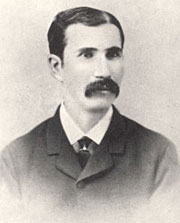
AFTER a year of exploration, Foucauld found himself back on French territory on the 23rd May 1884. He stayed in Algiers. After the nervous tension of those last twelve months, he indulged in all sorts of mad amusements, for which he will later reproach himself. It is not a convert who is returning from Morocco!
At the beginning of the month of June, he suddenly returned to Paris, in order to present a first account of his travels to the President of the Geographical Society. He then went to Tuquet, in the Gironde near Bordeaux, to see his aunt Moitessier, who received him like a prodigal son, severely but kindly. As for his Aunt’s daughters, his cousins, they were nothing but goodness itself. After these four years of absence, he rediscovers his family.
« I arrived in the country this morning; staying here pleases me a thousand times better than staying in Paris: solitude in company with those one loves most in the world, a charming countryside, all trees, water and greenery, it is more beautiful than is necessary to make me perfectly happy. » (Letter of the 19th June 1884)
With her husband and her four children, Marie de Bondy seemed to him to be in the best of health, whereas her sister, Catherine, suffered from neglect by her husband, Emmanuel de Flavigny. Aunt Inès was planning to marry Mimi with Raymond de Blic. She was waiting for Charles’s return to make the introductions. The marriage would be celebrated at the end of the year, on the 30th December. From that date, Charles felt that he was relieved of his role as tutor.
But he was so exhausted that he fell ill and had to keep to his room for most of the summer.
At the beginning of 1885, he went back to Algiers in order to write his “Reconnaissance in Morocco”. Of his stay there this time he will say that it was « only full of ill ». Perhaps he was exaggerating, but he fell ill again, which set back all his travel plans.
It was at this time that he met the daughter of Commandant Titre, a geographer in MacCarthy’s circle. Only recently converted, this young girl appealed to him, and he thought of marrying her to put an end to his own moral disorders. Marie de Bondy wisely dissuaded him from this marriage, and Charles will always be grateful to her for that.
On the 24th April 1884, the Geographical Society awarded him the Grande Medaille d’Or, but it was Olivier de Bondy who received it in his name. He did not come back to France for that; glory was not his interest. He found his path, which was that of study and research. No sooner had he got over his long illness, than he undertook a further expedition, on the 14th September 1885. He visited the South Algerian oases in order to complete his work by making various comparisons.
Joining a military column, he met with Motylinski again and became his friend. He passed through Ouargla and continued east in order to reach Gafsa. His plan was to return via Tunis. But he cut his journey short and hurriedly returned to France, for some unknown reason: perhaps to visit the Blics, since his sister had just given birth to her first child. After a short stay at Nice, he returned to Paris.
THE RUE DE MIROMESNIL.
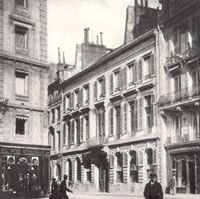
On the 19th February 1886, he installed himself at n° 50, rue de Miromesnil, not far from his aunt Moitessier, who lived at n° 42, rue d’Anjou. He will spend four years in Paris, living alone, and wholly occupied with his research and writing his book. He often takes his meals with his aunt: it is his family, where he finds himself among cousins and kinsmen. But he will make no friend except for Duveyrier, with whom he has very frequent and close relations. They spend hours planning the peaceful penetration of the Sahara in order to link the Sudan to Algeria. On the 2nd October 1888, after the death of Madame de Morlet, Charles writes to Duveyrier:
«Your friendship, the only one outside my family I have made during my three years in Paris, is one of those sweet bonds that show life under a more serene light at certain hours.»
When he is with the Moitessiers, who hold a brilliant and much frequented political salon, especially frequented by Orleanists, he slips away as soon as friends arrive. That kind of politics holds no interest for Charles and leaves him cold.
Since his return from Morocco, he is no longer the same man. He lives in solitude and chastity and studies deeply. At the end of September, he will make another brief visit to Tunis before putting the final touch to his book. He finds Africa again in his apartment: he puts on his turkish slippers and his djellabah and sleeps on an oriental carpet, on the floor. In this simple and austere life, he turns towards the things of God. The agnostic world in which he had been living for ten years capsized in contact with these holy women whom he sees living nearby and whom he loves immensely. Their discretion is perfect: they simply show for him a great affection. He observes them very closely and can find nothing in them with which to reproach the religion they practise. It is this silent witness of their devotion and of their virtues which leads him back to the faith.
In order to penetrate Charles’s soul during those crucial years, there is nothing better than to read the letters and meditations in which he will later analyse his own conversion:
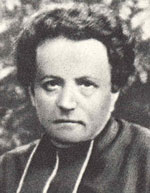
«I told you not so long ago to pray even before believing in God. That is what I did when I began to realise, to glimpse that perhaps the Catholic religion was not so absurd. I often used to say this prayer: “My God, if You exist, make me know You.” You can do the same. I know of only one merit in my life, and that is, after having made this prayer for some time, and finding myself very sincerely disposed to embrace the truth with my whole soul if I found it, I took the proper means to discover it. If you want to learn a science or a language, you find a teacher. Wanting to learn religion and to be enlightened concerning difficulties that seemed to me insoluble, I looked for a teacher as I would for any other science. I turned to Father Huvelin, a former student of the École Normale, whom I knew to be very learned. He lived at n° 6, rue de Laborde. Only, I tell you from experience, that, in order to find God, purity of heart and chastity are a great help. I tell you this from experience: when the will chains the body, the soul takes wings to soar towards the truth. I have told you my confession. Adieu, my dear friend. Forgive me for this lengthy scribbling and for the spelling mistakes. I haven’t the time to re-read it.» (Letter to his cousin Louis de Foucauld, 28 Nov. 1894)
Thus, he sought God just as he had prepared his expedition to Morocco, with the same seriousness and the same precision.
On the 14th August 1901, he wrote to Henry de Castries, his former companion from Pont-à-Mousson, a legitimist, a defender of the Church, and yet still an unbeliever:
«Whilst I was in Paris and having my book “Voyage au Maroc” printed, I found myself among people who were very intelligent, very virtuous and very Christian. I said to myself that perhaps this religion was not absurd. At the same time, I was pushed by a very strong interior grace. I went to church without believing, finding myself at ease only there, and I would spend long hours repeating this strange prayer : “ My God, if You exist, make me know You. ” The idea came to me that I ought to take instruction in this religion, where perhaps what I despaired of might be found. And I said to myself that the best thing would be take lessons in the Catholic religion, as I had taken lessons in Arabic. As I looked for a good thaleb to teach me Arabic, so I looked for a learned priest to instruct me in the Catholic religion. I was told of a very distinguished priest, a former student of the École Normale. I found him in his confessional and I told him that I had not come to confess because I did not have the faith, but that I just wanted information about the Catholic faith. The good God, Who had begun the work of my conversion so powerfully, through this very strong interior grace which pushed me almost irresistibly to the Church, brought it to completion. The priest God directed me to was someone unknown to me: a man of great learning, and of ever greater virtue and goodness. He it was who became my confessor, and has not ceased to be my confessor and my best friend during the intervening fifteen years.
«As soon as I believed that there was a God, I understood that I could do no other than to live for Him. My religious vocation dates from the same hour as my faith. God is so great! There is such a difference between God and everything that is not Him! At the beginning, the faith had many obstacles to overcome! I who had doubted so much, did not believe everything in one day. Sometimes it was the miracles in the Gospel that seemed to me unbelievable; at other times I wanted to mix passages of the Koran with my prayers. But with divine grace and the advice of my confessor those clouds were dispelled.
« I desired to be a religious and to live only for God, to do what was most perfect, whatever it might be. My confessor made me wait three years. Desiring to give my all to God, in a pure loss of myself, as Bossuet says, I did not know which order to choose. The Gospel showed me that the first commandment is to love God with all one’s heart and that everything had to be enclosed in love. Everyone knows that the first effect of love is imitation: it remained for me, therefore, to enter the order where I found the most exact imitation of Jesus. I did not feel myself formed to imitate His public path in preaching: I had, therefore, to imitate the hidden life of the poor workman of Nazareth. It seemed to me that this life was best represented by the Trappists... I loved with a very tender love all that the good God had left me by way of family; I wanted to make a sacrifice in order to imitate Him who made so many sacrifices, and so, nearly twelve years ago, I left for a Trappist monastery in Armenia.» (Lettres à Henry de Castries, p. 95-98)
FATHER HUVELIN.
Saint Augustine’s was only two steps from where he lived. He would often go there at the end of the day. One day, perhaps the 27th October of that same year 1886, Charles approached the priest:
« Father, I do not have the faith ; I have come to ask you to instruct me.
– Kneel down, make your confession to God: you will believe.
– But I have not come for that !
– Make your confession», the priest insisted.
Charles obeyed and, on coming out of the confessional, Father Huvelin asked him :
« Are you fasting? »
– Yes.
– Come and receive Communion. »
And Father himself gave him Communion before Our Lady’s altar.
From that day, Charles attended Mass daily and received Communion frequently. The Eucharistic Heart of Jesus took up more and more place in his life, in the school of the homilies of him who had become the father and director of his soul. Later, Father de Foucauld will write to Father Huvelin :
« It was in the very last days of October, the 29th or the 30th, twelve years ago, that I presented myself at your confessional, that you gave me to the good God, sent me to receive Communion and became my father !
« How I needed the good God to give me you to be my father, and how good He is for having made me this gift ! How I bless Him for this ! (Letter of the 15th October, 1898; Father de Foucauld – Father Huvelin, Unpublished correspondence, Desclée, 1957, p. 89)
MARIE DE BONDY.
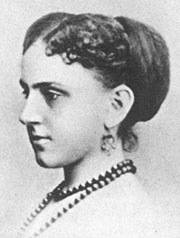
Although it was Father Huvelin who converted Charles de Foucauld, it was Marie de Bondy who first engendered him to the spiritual life : « Marie was for Charles, our Father explains, a reflection of things divine. She was for him the image of holiness. Her love implanted in his own soul the love of God. »
Marie was truly the mediatrix for her cousin through «The Mystery of the Visitation», which will soon be at the centre of Charles de Foucauld’s spirituality. Madame Castillon du Perron thinks that she can detect an erotic tendency in Charles’s affection for Marie. Our Father protests! But it takes nothing less than his relational metaphysics and his teaching on “positive purity” to combat this error, in establishing that, as it grows, true friendship moves away from sensuality by bringing its portion of supernatural graces. This love uplifts the soul, through the being it loves and sees, to the heart of the “circumincessant charity” of God the Father, Son and Holy Ghost. Charles de Foucauld knew this grace, as he writes in his moving “ Nazareth Retreat ” in 1897 : « Me, my past life, God’s mercy ». Our Father likes to say that he knows of no other text that relates with such precision, finesse and beauty the conversion of a soul and its progress towards God.
The first part of this retreat is an act of thanksgiving for having been spared the horse riding accidents, the duels and the dangers encountered while on expedition. Had he died then, where would he be now?
« Such unfailing health in the most insalubrious of places, despite great fatigue. Oh my God, how You kept Your hand on me, and how little I felt it! How good You are ! How You guarded me! You protected me beneath Your wings when I did not even believe in Your existence! And while You thus protected me, the time passed. You judged that the moment was approaching for me to re-join the fold. Despite myself, You untied all the bad relationships that would have kept me away from You. You even untied all the good relationships that would have prevented me from re-entering the fold of this family where You wanted me to find salvation, and which would have kept me from being all Yours one day. At the same time, You gave me a life of serious study, an obscure life, a solitary and poor existence.
«My heart and mind remained far removed from You, yet nevertheless I lived in a less vitiated atmosphere. It was not the light, nor the good - far from it! But I was no longer in such deep mire, nor in such odious evil. The place was gradually being swept clean. The flood water still covered the ground, but it was gradually receding, and the rain no longer fell. You had broken the obstacles, softened the soul and prepared the ground by burning all the thorn bushes on it. Through necessity, You obliged me to be chaste. And before long, having been brought back to my family in Paris at the end of the winter of 86, I found that chastity had become sweet and a need of my heart.» (La Dernière Place, p. 102-103)
It is certain that the influence of his aunt Inès, of his cousin Marie, very pure and pious women who loved him with a most holy affection, exerted on him a demand for total and interior purity. Brother Charles de Jesus remembers this as a miracle that saved him from the abyss. Because Marie de Bondy may still have been alive when René Bazin first published this text, he abridged it, but it needs to be quoted in full:
«It is You Who did that, my God! You alone! I had no hand in it, alas! How good You were! From what sad and culpable relapses You mercifully saved me! Your hand alone was in this, at the beginning, in the middle and at the end: how good You are! It was necessary to prepare my soul to receive the truth. The devil is too much master of a soul that is unchaste to allow the truth to enter. You cannot enter, my God, into a soul where the devil of impure passions reigns as master!
«You wanted to enter into mine, good Shepherd, and so You chased out Your enemy Yourself. And having chased him out by force, despite myself, and seeing my weakness and how incapable I was of keeping my soul pure, You gave me such a good, strong and gentle guardian that not only did he forbid the least entry to the demon of impurity, but he made the delights of chastity sweet and necessary for me. It is You Who did that, my God! How good You are, my good Shepherd! When You wish to save a soul, You quickly chase out Your enemy and place there Your earthly and heavenly angels to be its all-powerful guardians. Thus, despite me and without me, You chased the devil out of my soul, and You set two angels in his place for its invincible defence. And You gave these angels enough power to be invincible.
«My God, how good You are! How shall I sing of Your mercies, my God? And after emptying my soul of its filth and having entrusted it to your angels, You thought of re-entering there, my God! For after receiving so many graces, my soul still did not know You. You continually acted in it and on it; You transformed it with a sovereign power and an astonishing rapidity, and still it knew nothing of You. You then inspired it with a taste for virtue, pagan virtue. You let me search for virtue in pagan books of philosophy, and all I found there was emptiness and disgust.» (ibid., p. 103-104)
One wonders why he did not immediately engage in religious conversations with these women. That is to forget the whole background of scepticism, his reading of Montaigne, of the sceptics, of Voltaire, all this humanism deposited in him from a very young age, from class one, and never retracted. So, he took up his pagan philosophers, in their fine leather bindings; then one day, he opened and flicked through the book Marie de Bondy had given him for his First Communion : Les Élévations sur les mystères, by Bossuet.
«You then let a few pages of a Christian book fall beneath my eyes, and You made me feel their warmth and their beauty. You gave me a glimpse of what I might perhaps find there, if not the truth, - I did not believe men were capable of knowing the truth -, at least some teaching on virtue, and You inspired me to look for lessons in purely pagan virtues in Christian books. Thus, You familiarised me with the mysteries of religion.» (ibid.)
A familiarity that had been lost for how long? Had he ever known it? He had placed flowers at the foot of wayside Calvaries, he had sung the Months of Mary, but as for religious instruction, despite the priest who saw him through, what had it been? For the first time, he was being initiated into a religion of which he knew nothing and in the school of those whom he loved with all his heart of gold:
«At the same time, you tightened still more the bonds that united me to those beautiful souls. You had brought me back to this family, the object of passionate attachment in my early years, in my childhood. You made me rediscover the admiration I once had for these same souls. And you inspired them to receive me like the prodigal son. who is made to feel as though he had never left his father’s home. You gave me through them the same goodness I might have expected had I never lapsed. I drew closer and closer to this beloved family. With them, I lived in such an atmosphere of virtue, that I could be seen returning to life; it was springtime restoring life to earth after winter! It was in this gentle sun that the desire for good and the disgust with evil grew, that it became impossible for me to relapse into certain faults and that I sought for virtue: You had chased the evil out of my heart. My good angel had taken his place there, and You had added an earthly angel too... At the beginning of October of that same year 86, after six months of family life, I admired and I desired virtue, but I still did not know You. By what devices, God of goodness, did You make Yourself known to me? What crooked paths You used! What strong but gentle outward means! Such a series of surprising circumstances in which everything came together to push me towards You! Unexpected solitude, emotions, illnesses to be treasured.» (ibid., p. 105)
In October 1886, Marie de Bondy fell ill, quite seriously ill. He was shaken, and perhaps it was then that he, who did not yet believe, began to pray for her.
«Ardent, heartfelt sentiments, return to Paris in the wake of a surprising event. And what interior graces: this need for solitude, for recollection, for pious reading, this need to visit Your churches, for me who did not believe in You. This troubled soul, this anguish, this search for the truth, this prayer: “My God, if You exist, make me know it!” All that was Your work, my God! Yours alone! A beautiful soul assisted You, but by her silence, her gentleness, her goodness, her perfection.» (ibid.)
Not one of these words is superfluous. Here we have the apostolate of which Father de Foucauld will dream all his life! Having experienced it himself first, as the instrument of his salvation: in the person of Marie, all gentleness and goodness, even more tender and merciful than if she had been his mother.
«She appeared to be good, and she was good. She spread her attractive perfume, but it had no effect. You, my Jesus, my Saviour, You did everything, from within and from without.»
So, she was not the cause of his conversion, but the catalyst. It was Jesus Who acted. Until the end of his life, especially when recalling the great moments of his existence, he will say that just to see her always did him good. Just to see her! This insistence clearly shows the purity of his affection for her whom he will call «my mother». She herself was as though lit from within. All her actions were manifestly inspired by this light, this love of God.
«You drew me to virtue through the beauty of a soul, in whom virtue appeared to be so beautiful that it irrevocably charmed my heart.
«You drew me to the truth through the beauty of this same soul. You then gave me four graces. The first was that of inspiring me with this thought: since this soul was so intelligent, the religion she firmly professed could not be folly as I had thought.
«The second was to inspire me with this other thought: since this religion is not folly, perhaps the truth, which is not to be found in any other religion on earth, nor in any other philosophical system, is actually here.
«The third was to say to me: So let’s study this religion; take a teacher in the Catholic religion, a learned priest, and let us see what it is all about and whether what it says has to be believed. The fourth was the incomparable grace of turning me to Monsieur Huvelin for these lessons in religion.»
It was his “spiritual mother”, who was to lead him towards this priest, who had been her director for ten years. Here he is at Saint Augustine’s:
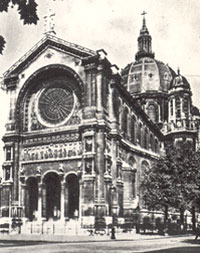
«In making me enter his confessional, one of the last days of October, between the 27th and the 30th I think, You gave me every good thing, my God! If there is joy in Heaven over one sinner who converts, there was joy when I entered that confessional. What a blessed day! What a day of blessing! And since that day, my whole life has been a series of blessings. You placed me beneath the wings of this saint and I have stayed there.»
The admiration he had for his cousin, he transferred entirely to this priest, regarding him as a saint whom he only had to follow, like a child following his father:
« You have carried me in his hands ever since, and it has been grace after grace. I asked for lessons in religion : he made me kneel down, made me make my confession and sent me to receive Communion there and then.
«I cannot help weeping when I think about it, nor do I wish to stop these tears from flowing: they are all too justified, my God! What a stream of tears should flow from my eyes at the memory of such mercies...
« How good You have been ! How happy I am ! What have I done for that ? And since then, my God ! it has been an ever growing chain of graces, an ever rising tide. Direction, and what direction ! prayer, holy reading, daily attendance at Mass, established from the first day in my life. Frequent Communion, frequent confession, coming at the end of a few weeks, spiritual direction becoming more and more intimate and frequent, enveloping the whole of my life, making it a life of obedience in every least thing, and of obedience to what a master!»
«With Communion becoming almost daily, the nascent desire for the religious life grew stronger. External events, independent of my will and contrary to my will, forced me apart from external objects, from material things that held great charm for me and which could have held back my soul and kept it attached to the earth!»
He had brought back from Morocco a whole lot of things, objects of desire to his nephew François de Bondy. Little by little, he gave them to him, but at a cost. After all, that expedition to Morocco was the best of his life, and so he held on to those objects. In letting them go one after the other, not without a spirit of sacrifice, he felt his soul pervaded by grace in proportion to the void left by his old life, which was passing away.
«You violently broke those bonds as well as so many others. How good you are, my God, in having broken everything around me, in having wrecked everything that would have prevented me from being Yours alone!
«An ever deeper sense of the vanity and of the falseness of worldly life and of the great distance that exists between the perfect, evangelical life, and that which is led in the world.»
He had already seen the spectacle of worldly life in the salon of the Moitessiers.
«This tender and growing love for you, my Lord Jesus, this taste for prayer, this faith in Your word, this profound sense of the duty of almsgiving, this desire to imitate You, these words of Monsieur Huvelin’s in a sermon, that «You had so much taken the last place that no one had ever taken it from You”, so indelibly engraved on my soul, this thirst to make You the greatest sacrifice possible for me to give You, by leaving for ever a family that was all my happiness, and going far away from them to live and to die.»
What better had he, what more precious, than these purely spiritual bonds with Marie de Bondy? From the moment of his return to God, that is what he thought of offering, not by half, not for a time, but for ever!
There is nothing aesthetic about this radicalism: it is purely ascetic and mystical. It is the radicalism of love. For the love of Jesus, to give the most precious of what one has, and to give it for ever,
«By going far away from her to live and to die... This search for a life conforming to Yours, where I could completely share Your abjection, Your poverty, Your humble labour, Your burial, Your obscurity.» (ibid., p. 107-108)
Marie, who had been Charles’s mediatrix in leading him irrevocably to the Heart of Jesus, will not hold him back. Her affection is absolutely pure, for she is wholly “in God”. Like the Blessed Virgin Mary with Our Lord, she let him follow his vocation into the desert, and it will be his ascent to Calvary...
For now, Charles’s conversion will lead him to the Trappists, as we shall subsequently see.
Let us enter into this great flame of love so that Father de Foucauld can lead us and enkindle us in our turn, knowing that God is calling us to holy loves that transport us to Heaven.
CCR n° 292, January 1997